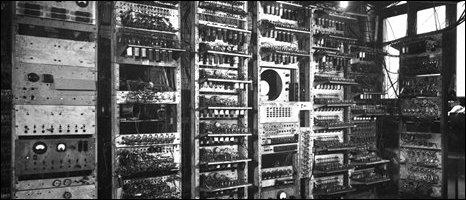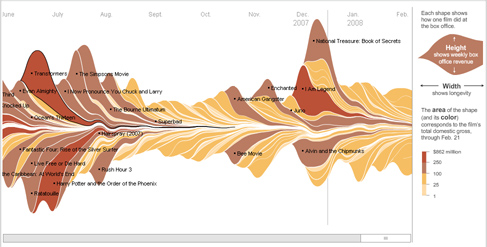New Delia Derbyshire tapes discovered
Read the full article (with audio!) on the BBC website
A hidden hoard of recordings made by the electronic music pioneer behind the Doctor Who theme has been revealed – including a dance track 20 years ahead of its time.
Delia Derbyshire was working in the BBC’s Radiophonic Workshop in 1963 when she was given the score for a theme tune to a new science fiction series.
She turned those dots on a page into the swirling, shimmering Doctor Who title music – although it is the score’s author, Ron Grainer, who is credited as the composer.
Now David Butler, of Manchester University’s School of Arts, Histories and Cultures has revealed for the first time the existence of 267 tapes found in Ms Derbyshire’s attic when she died in 2001.
They were, until last March, in the safekeeping of Mark Ayres, archivist for the Radiophonic Workshop – and have lain unheard for more than 30 years.
[via Create Digital Music]
No commentsThe first recording of computer music?
‘Oldest’ computer music unveiled – BBC News

No commentsThe songs were captured by the BBC in the Autumn of 1951 during a visit to the University of Manchester.
The recording has been unveiled as part of the 60th Anniversary of “Baby”, the forerunner of all modern computers.
The tunes were played on a Ferranti Mark 1 computer, a commercial version of the Baby Machine.
masterfull radiohead remix with repurposed technology
sadly (for showing my age), I recognized all the gear he used and owned several pieces of it. In fact, I probably still have my scanjet 4C sitting in a box somewhere…
I also like the way he did the video, looks straight out of ’84
Big Ideas (don’t get any) from James Houston on Vimeo.
How to turn user indifference into user anger
When Google turned off Google video, they gave their users credits for the videos that they had purchased. Sure, a lot of them were annoyed, but there weren’t that many paying customers in the first place (hence the shuttering). Now MS is following suit, but has no “upgrade” path for customers of its Plays For Sure technology. Again, this wasn’t a successful service (obviously), but what would happen if a bigger DRM-house closed down. You’d see class action lawsuits and bills introduced in congress right-quick. If content providers insist on DRM then content providers must make provisions in their contract for support of their customers for a long, long time. It’s not just the users that should sue Microsoft (per se), it’s the record labels and the artists. Otherwise, users will start to distrust the digital stores and they will go straight (back?) to piracy.
DRM sucks redux: Microsoft to nuke MSN Music DRM keys (Ars Technica)
Customers who have purchased music from Microsofts now-defunct MSN Music store are now facing a decision they never anticipated making: commit to which computers and OS they want to authorize forever, or give up access to the music they paid for. Why? Because Microsoft has decided that its done supporting the service and will be turning off the MSN Music license servers by the end of this summer.
[via techdirt]
No commentsMusic Tax Details From Source: “Pay Us Not To Sue Youâ€
Music Tax Details From Source: “Pay Us Not To Sue You†(TechCrunch)
We learned yesterday that Warner Music, the third largest music label, is gunning for a $5/month music tax on U.S. residents.
The death throes of an industry that hasn’t figured out how to adapt. One thing that I never figured out about the music industry was it’s inability to be innovative around it’s business models. At the independent level, sure. But at the top-end, they are working on nearly the same model since the day the industry originated. For an industry that is all about “cool,” this is surprising. Their current set of challenges aren’t new. They are dating back twenty years! Remember “Home Taping is Killing Music?” The technology has been evolving for decades and rather than embrace it and figure out how to work with it, the music industry has fought it every step of the way until we reach this point: “Pay us in case you might want to pirate music.”
This is extortion and the ISPs need to band together to fight it.
No commentsRecorded music should be free?
As one of many artists who has made more money over the years from live performance than from selling records, the argument that we might be moving to a system where music would be free in order to draw people to live performances has resonated with me. I just came across the Stretta blog today and saw this:
The Stretta Procedure
The fact of the matter is Recorded Music and Live Music are separate art forms. Theyre lumped together in our minds for many reasons, but for people who push the idea that recorded music should be free, it is convenient to exclude all other types of musical expression that dont fit into their new world order business model, which, incidentally, benefits them the most Will we soon justify torrenting movies for free because theyre simply promotional material to drive awareness of actors, who should derive all their income from performing in stage plays?
I just really liked that…
No commentsNew life for Nord Modulars
electro-music.com :: View topic – Nomad 0.3 pre-release available for DL
The Nord Modular was the first major synth hardware with required software for programming it. It was extremely powerful. I own two! It was also the gear that soured me on the whole idea. Why? Because, Clavia never upgraded the editor to work with OS X. There was a beta release, but it didn’t work that well. So now, that very expensive hardware is mostly worthless.
Luckily, some bright hackers decided not to let it lie: Nomad is nord editing software written in Java for OS X, PC and Linux.
What would have been better would have been if Clavia had released their software as open source, so that folks didn’t have to reverse engineer it.
This is why I won’t ever buy a Nord Modular G2, by the way.
No commentsNice visualization from the NYT

Conveying data that spans more than 2 dimensions is classically difficult. In fact, successful representations like the map of Napoleon’s march from CJ Minard are celebrated. I saw this Flash thing from the New York Times representing box office returns from Hollywood films and I was really impressed how nice a job it did showing some disparate things in a cohesive way. Worth taking a look at if you think about this kind of stuff.
No commentsTrent Reznor Walks the Walk
After his previous experiment with Saul Williams was not quite a rousing success, I figured that Nine Inch Nails frontman Trent Reznor was done toying with the music business model. Turns out that he was just getting started. The new Nine Inch Nails album is now available in multiple forms. The first part is available for free in high quality on bit torrent sites. The whole thing is available for download for $5 off the Nine Inch Nails site with a killer booklet in PDF. You can buy the 2 CDs for $10, and then there are two limited edition packages for $75 and $300.
I think this is just brilliant. Basically, he gives his fans choices at reasonable price points and makes it hard for them to not do the right thing.
As other high-profile artists emerge from their traditional contracts, I expect that we’ll see a lot more movement towards self-distribution. Especially, with artists like NIN and Radiohead who have a large percentage of their audience on-line already and can do better without the overhead of a large record label.
No comments